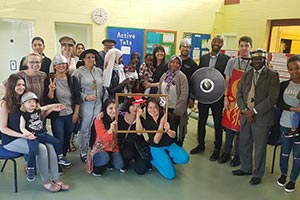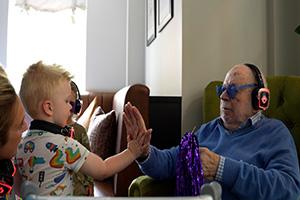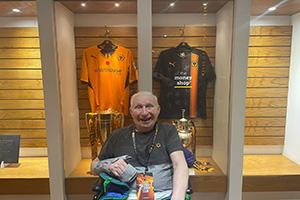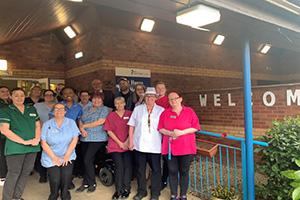Using history to combat loneliness and isolation: pilot study in Doncaster could lead national effort
The nation has never been more aware of social isolation and loneliness than in the current lockdown, but a new report published by Heritage Doncaster following a pilot project that started last Autumn may offer a glimmer of hope for those living with the devastating effects of isolation, and provide a template to museums and heritage organisations across the nation to use collections and curators to help people re-engage in the world.
Even before the current Covid-19 lockdown, people who had become socially isolated – including stay-at-home mothers, older people and minority groups – generally suffered more physical and mental health conditions, and these were the focus of the programme run by Heritage Doncaster and funded by Arts Council England around specific boroughs within the town. The impact report on the “History, Health and Happiness Project” shows how museum collections were used to tackle isolation and improve wellbeing in four key parts of Doncaster, making participants more connected to others in their community, and giving them pride in the place they live.
“This is a small scale study, but we are in the midst of the largest period of social isolation our generation has seen, and even when lockdown ends, the sudden shrinking of the UK and global economy is likely to bring more unemployment, poverty and isolation, which in turn fuels more ill-health, decreased efficiency on the workforce, and more pressure on health services,” says project manager, Victoria Reeves. “Just about every museum in the country is trying to find ways to engage with a wider audience – and we’ve seen brilliant initiatives during lockdown like #MuseumAtHome – but this report shows how they can engage with new people, not only to share enthusiasm for the past, but to make a real difference to the wellbeing and health of people who might not normally engage with heritage organisations.”
As part of the project, Heritage Doncaster’s team and volunteers had spent over 300 hours with the local community, taking the time to chat over 2500 cups of tea, and bringing to life over 400 objects from the museum collection. Participants from a huge range of backgrounds – from young mums to those living with dementia- have recreated Roman recipes, designed fashion accessories inspired by historic iconography, set up social clubs, written stories, curated special exhibitions, and shared their own amazing histories, from the joy of sex to rock metal stardom.
“We’d originally set out to help those most at risk of mental health problems in the community, and we’d been really excited about progress made during the pilot projects in the latter half of 2019, says Victoria. “It was wonderful to see so many people come out of their shells, their confidence improving so much that they’d gone from barely speaking a word to giving us the history lessons! It’s given them a thirst for life and learning.”
The initial report reveals that participants experienced a 23% rise in confidence, 11% increase in happiness levels, 11% rise in feelings of belonging and connectedness, 14% improvement in ‘sense of place’, and 20% increase in optimism about the future (data analysed by Arc Research & Consultancy Ltd and Sheffield Hallam University).
“History at school tends to focus on the big picture – places, dates and large events - whereas our collections more often tell the stories of individuals, normal people going about their lives, local people overcoming adversity and beating the odds – suffragettes making a stand against prejudice, the extraordinary resilience of those who faced the Blitz. These are stories that people can relate to – these could be their grandparents or great grandparents,” adds Victoria. “Getting to know these people from the past is an ideal way to get us through our own turbulent times, and to give our mental well-being a much-needed boost. More than that, history has the ability to unite people through a sense of shared past. It helps us make connections, spark conversations and creativity; it makes us feel as though we belong.”
Over the past few weeks of lockdown, Heritage Doncaster has been encouraging local people to get involved in a new Living Room Museum; rallying local people to become tomorrow’s historians by sharing their own experiences of the crisis; and making up care home packages, which include hands-on activities, and some comforting treats.
Victoria adds: “We’ve got some exciting plans in the pipeline, but we can’t achieve anything without the help of our volunteers, and we need more people to get in touch and share their time. During lockdown, many of us will have felt lonely, stressed and isolated – but for many others in your neighbourhood, this is their everyday. By understanding what it’s like, we’re really hoping that people step forward to combat loneliness and help those whose lives won’t go back to normal on the other side of the pandemic – by giving just a little piece of your time, it could mean so much, and you could even help save a life.”
To get involved or to find out more, visit www.heritagedoncaster.org.uk or on social @DoncasterMuseum.





